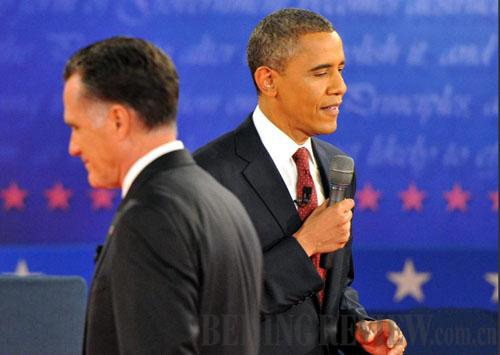|
 |
|
ROUND TWO: The second U.S. presidential debate takes place in Hofstra University, Hempstead, NY, on October 16 (WANG LEI) |
The second U.S. presidential debate turned into an apparent contest over who could criticize China most harshly.
The debate, a town-hall style face-off between the two candidates, was held in Hofstra University in Hempstead, New York on October 16.
Both President Barack Obama and his challenger, Governor Mitt Romney, targeted China during an argument about domestic issues including currency policies, trade regulation, and job creation.
Romney said President Obama has been too lenient in trade disputes and promised to label China a currency manipulator on his first day in office, if he was elected.
"The president has a regular opportunity to label them as a currency manipulator, but refuses to do so," Romney said.
Seizing an opportunity to showcase his tough stance on China, President Obama argued his administration's approach was producing results.
"The currency (Renminbi) has actually gone up 11 percent since I have been president because we have pushed them hard. And we have put unprecedented trade pressure on China," said Obama. "That is why exports have significantly increased under my presidency. That is going to help to create jobs here."
Romney even asserted that the Apple products are made in China because of unfair exchange rates, while President Obama admitted that some low-paid and low-tier jobs will never return to America.
U.S.-China ties could be hurt if the last two debates between President Barack Obama and Republican challenger Mitt Romney turn into a "China-bashing competition," China's official Xinhua News Agency said in a commentary after the debate.
Hong Lei, China's Foreign Ministry spokesman, echoed the view of Xinhua at his briefing in Beijing on October 17.
When asked about his response to the criticism and negative perception of China in the American presidential debate, Hong Lei said that China hopes politicians in both the Democratic and Republican Party in the United States can view China's developments in a fair and objective manner, and China hopes the candidates can recognize the mutually beneficial nature of China-U.S. business relations.
Bloomberg news agency asserted that threatening a trade war with China is a "terrible idea." The website listed "five worst ideas Romney and Obama agree on," one of which is: "We need to get tough on China."
The article comes after the second debate, saying the Renminbi is "a lot less undervalued than it used to be because the Chinese have been gradually letting it rise." It also pointed out that the undervaluation "makes our manufacturers less competitive, but it also makes the products we buy cheaper."
C. Rose, an Obama campaign staffer, agreed that America also benefits a lot from China's development. "I believe that if elected, President Obama will continue to respect the fact that China's economy is growing and is an important trade partner of America," she told Beijing Review.
The Xinhua commentary said there is an embarrassing trend that past U.S. presidents have often toned down their tough talk on China after taking office.
According to the website of the Commission on Presidential Debates, one of the six topics for the third and last debate on October 22 is "The Rise of China and Tomorrow's World."
(Reporting from Hempstead, New York) | 